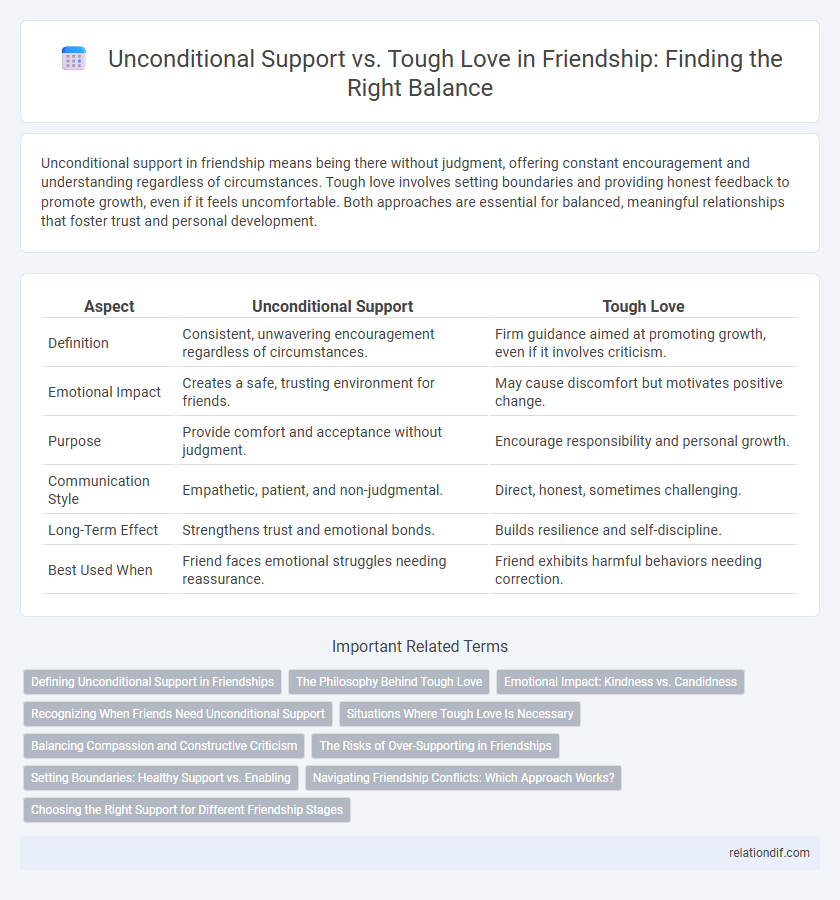Unconditional support in friendship means being there without judgment, offering constant encouragement and understanding regardless of circumstances. Tough love involves setting boundaries and providing honest feedback to promote growth, even if it feels uncomfortable. Both approaches are essential for balanced, meaningful relationships that foster trust and personal development.
Table of Comparison
| Aspect | Unconditional Support | Tough Love |
|---|---|---|
| Definition | Consistent, unwavering encouragement regardless of circumstances. | Firm guidance aimed at promoting growth, even if it involves criticism. |
| Emotional Impact | Creates a safe, trusting environment for friends. | May cause discomfort but motivates positive change. |
| Purpose | Provide comfort and acceptance without judgment. | Encourage responsibility and personal growth. |
| Communication Style | Empathetic, patient, and non-judgmental. | Direct, honest, sometimes challenging. |
| Long-Term Effect | Strengthens trust and emotional bonds. | Builds resilience and self-discipline. |
| Best Used When | Friend faces emotional struggles needing reassurance. | Friend exhibits harmful behaviors needing correction. |
Defining Unconditional Support in Friendships
Unconditional support in friendships means offering consistent understanding and acceptance without judgment, regardless of circumstances or mistakes. It involves being a reliable presence who listens empathetically and encourages growth without imposing conditions. This type of support fosters trust and security, allowing friends to feel valued and accepted for their true selves.
The Philosophy Behind Tough Love
Tough love embraces a philosophy that prioritizes growth and accountability over immediate comfort, encouraging friends to confront difficult truths for long-term well-being. This approach balances empathy with firm boundaries, aiming to foster resilience and self-improvement rather than dependency. By emphasizing responsibility, tough love nurtures authentic connection through honesty and mutual respect.
Emotional Impact: Kindness vs. Candidness
Unconditional support in friendship fosters emotional safety and trust through consistent kindness, allowing individuals to feel valued and understood without fear of judgment. Tough love, emphasizing candidness, challenges friends to grow by offering honest, sometimes uncomfortable feedback that encourages self-improvement and resilience. Balancing these approaches enhances emotional depth, as kindness nurtures connection while candidness promotes authenticity and personal development.
Recognizing When Friends Need Unconditional Support
Recognizing when friends need unconditional support involves paying close attention to their emotional state and life circumstances, such as during moments of grief, mental health struggles, or personal crises. Unconditional support means offering empathy, patience, and nonjudgmental presence without expecting immediate change or improvement. This approach fosters trust and stability, helping friends feel valued and understood even in their most vulnerable times.
Situations Where Tough Love Is Necessary
Tough love is necessary in situations where a friend's harmful behavior threatens their well-being or personal growth, such as addiction or chronic irresponsibility. This approach involves setting clear boundaries and enforcing consequences, emphasizing accountability over comfort. By prioritizing long-term benefits, tough love fosters resilience and encourages positive change within the friendship dynamic.
Balancing Compassion and Constructive Criticism
Balancing compassion and constructive criticism in friendship involves providing unconditional support while setting healthy boundaries that encourage growth. Offering empathy with honest feedback fosters trust and helps friends overcome challenges without feeling judged. This equilibrium enhances emotional resilience and deepens the bond through mutual understanding and respect.
The Risks of Over-Supporting in Friendships
Over-supporting in friendships can lead to dependency, weakening personal growth and resilience. Excessive assistance may prevent friends from facing challenges needed to develop problem-solving skills and self-confidence. Balancing support while encouraging autonomy is essential to maintain a healthy, empowering relationship.
Setting Boundaries: Healthy Support vs. Enabling
Setting boundaries in friendship distinguishes healthy support from enabling by promoting mutual respect and personal growth while preventing dependency. Unconditional support provides a safe space for vulnerability but must be balanced with tough love to encourage accountability and resilience. Clear limits ensure friends uplift each other without sacrificing autonomy or enabling harmful behaviors.
Navigating Friendship Conflicts: Which Approach Works?
Navigating friendship conflicts requires balancing unconditional support, which fosters trust and emotional safety, with tough love, promoting growth through honest feedback and boundaries. Unconditional support offers a foundation of acceptance during difficult times, while tough love challenges friends to confront issues and evolve. The most effective approach depends on the friends' personalities and the conflict's nature, ensuring empathy and respect guide resolution.
Choosing the Right Support for Different Friendship Stages
Unconditional support fosters trust and emotional safety in the early stages of friendship, creating a foundation for long-term connection. Tough love becomes essential as friendships mature, encouraging growth through honest feedback and constructive criticism. Choosing the appropriate support style depends on the friendship's depth, balancing empathy with accountability to strengthen bonds effectively.
Unconditional support vs Tough love Infographic

 relationdif.com
relationdif.com